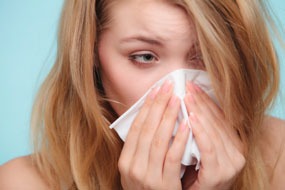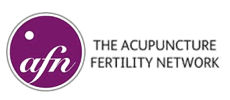Acupuncture for Allergies, Hay Fever, Allergic Rhinitis
Home > A-Z of Conditions Treated by an Acupuncturist > Acupuncture for Allergies, Hay Fever, Allergic Rhinitis
About a third of us suffer from allergy, rhinitis or hay fever at some time. Acupuncture can help.
 An allergy is an adverse reaction by the body when exposed to a normally harmless food or substance in the environment. The most common substances (allergens) which cause allergic reactions include grass and tree pollen (hay fever), house dust mites, mould, pets, certain foods and medications. In an allergic reaction the body’s immune system reacts to the allergen as if it were a threat. Subsequently the body remembers the allergen and produces an immune response whenever exposed to it.
An allergy is an adverse reaction by the body when exposed to a normally harmless food or substance in the environment. The most common substances (allergens) which cause allergic reactions include grass and tree pollen (hay fever), house dust mites, mould, pets, certain foods and medications. In an allergic reaction the body’s immune system reacts to the allergen as if it were a threat. Subsequently the body remembers the allergen and produces an immune response whenever exposed to it.
Symptoms of allergy typically include:
- Inflammation and swelling inside your nose, runny nose and sneezing (allergic rhinitis)
- Post nasal drip (sense of mucus running down the back of the throat)
- Wheezing, coughing, shortness of breath
- Tiredness, fatigue
- Sinus pain ( feelings of pressure behind the nose or around the eyes)
- Skin irritations
- Swelling
- Itchy eyes, ears, lips, throat and palate (inside the top of the mouth)
- Sickness, vomiting and diarrhoea
Some allergy sufferers may also experience a loss of sense of smell, headaches and sweats.
Rhinitis which occurs for only part of the year due to allergy to tree, grass or weed pollens during the ‘hay fever’ season is called seasonal allergic rhinitis. Symptoms which continue year round (perennial allergic rhinitis) are commonly caused by indoor allergens such as dust mites, pets or indoor moulds.
Genetic as well as environmental factors play a part in allergies. Allergies often run in families. Common allergic disorders include asthma, eczema and hay fever. If you have asthma, your asthma symptoms may get worse when you have hay fever.
Conventional medical treatments for hay fever aim to reduce or eliminate symptoms, enhance quality of life and reduce the risk of developing coexistent disease.
ACUPUNCTURE FOR ALLERGIES, HAY FEVER & ALLERGIC RHINITIS
 The aim of acupuncture is to identify and treat the underlying imbalances and thus address the cause(s) of disease as well as the symptoms. This approach can lead to a more fundamental and permanent resolution of problems.
The aim of acupuncture is to identify and treat the underlying imbalances and thus address the cause(s) of disease as well as the symptoms. This approach can lead to a more fundamental and permanent resolution of problems.
Clinical research evidence suggests that acupuncture and associated techniques may be a safe and effective treatment for allergic rhinitis with benefits over conventional medicine. In a review and analysis of clinical trials, the World Health Organization lists Allergic Rhinitis (2003) as one of the “conditions for which acupuncture has been proved through clinical trials to be an effective treatment.” Acupuncture has been shown to decrease symptom scores for persistent allergic rhinitis and increase symptom free days. Acupuncture may help relieve congestion and pain in allergic rhinitis by:
- Regulating our immunological response to allergens
- Increasing local blood circulation
- Reducing inflammation and swelling
- The production of endorphins (the body’s natural pain killers)
In general, acupuncture is believed to stimulate the nervous system, influencing the production of the body’s communication substances, such as hormones and neuro-transmitters. These influence the body’s self regulating homeostatic mechanisms and stimulate the body’s own natural healing abilities – thereby promoting physical and emotional wellbeing. Stimulation of certain acupuncture points on the body has been shown to affect areas of the brain that are known to reduce sensitivity to pain and stress, as well as promoting relaxation and reducing anxiety.
In Chinese Medicine, treatment strategies are different for seasonal allergic rhinitis (Hay Fever) and perennial (year round) allergic rhinitis. In perennial allergic rhinitis it is necessary to treat the root cause of the condition and the symptoms simultaneously regardless of the season. In seasonal allergic rhinitis, treatment during the pollen season is directed at treating the symptoms; but it is most beneficial if the underlying deficiencies can be addressed during the months prior to the pollen season so that the body is better ‘protected’ during the pollen season (Maciocia, 2005)
TREATING ALLERGIES, HAY FEVER AND ALLERGIC RHINITIS

“Acupuncture for the treatment of allergic rhinitis works at two levels. Firstly, it can help reduce your symptoms. In addition, acupuncture works to help treat the root cause of your condition, address any underlying imbalances, and thus improve your overall health. There’s also lots you can do to help yourself in the future. It’s really important to find out what triggers your symptoms. Many allergies are caused by allergens indoors, such as dust mites or moulds. Simple measures such as regularly airing your bed or using an air filter or dehumidifier in your house could massively improve your health and quality of life.”
FURTHER INFORMATION
Maciocia, G. 2005. The Practice of Chinese Medicine. Allergic Rhinitis. 143-146. Churchill Livingstone
World Health Organization 2003. Acupuncture: Review and Analysis on Controlled Clinical Trials – http://apps.who.int/medicinedocs/pdf/s4926e/s4926e.pdf
Research Fact Sheets
For more information see the British Acupuncture Council Research Fact Sheet below.
Testimonials
“Hi Judy, I just wanted to say Thank you. My eyes are getting better every day.”
“In the height of the Summer when I was 7 months pregnant I was suffering from hay fever so badly that I felt like I had the flu and was confined in doors for much of the day. As I was pregnant, anti histamines were not an option and so I looked to acupuncture for some help. Judy fit me in for an appointment promptly, following a consultation she got straight to work on this issue and following 4 appointments with her, my hay fever had completely disappeared and I am thrilled to say that I haven’t suffered with hay fever since then! I am so grateful for Judy, she is professional, knowledgeable and extremely talented. Thank you Judy!!”



